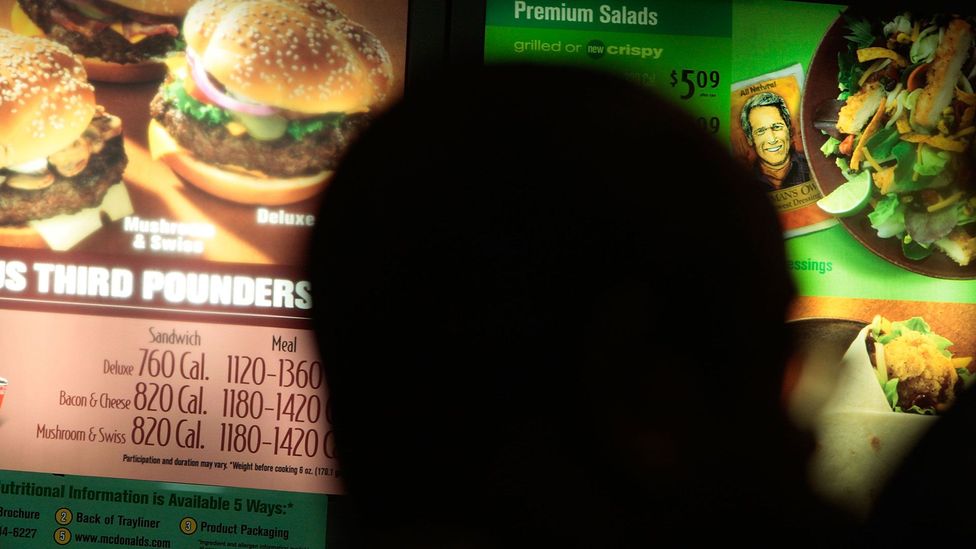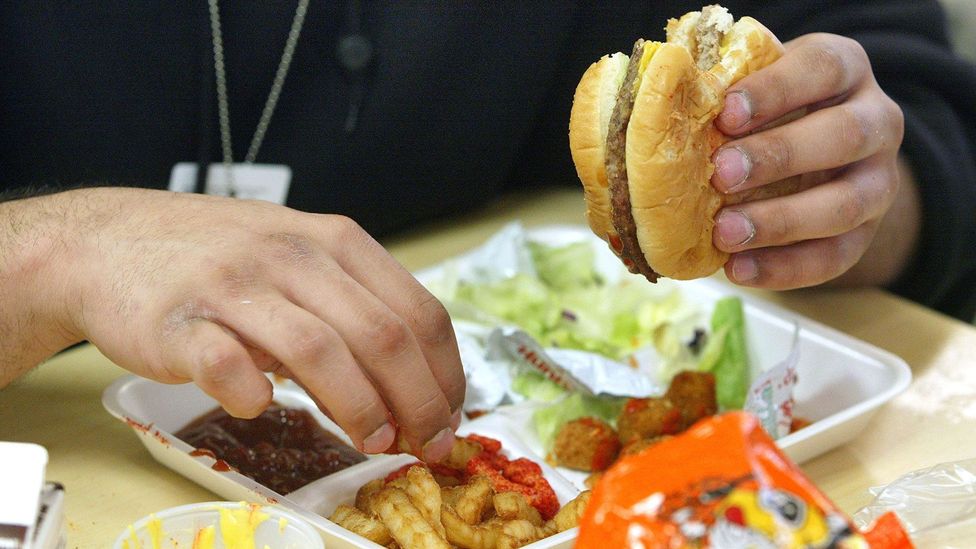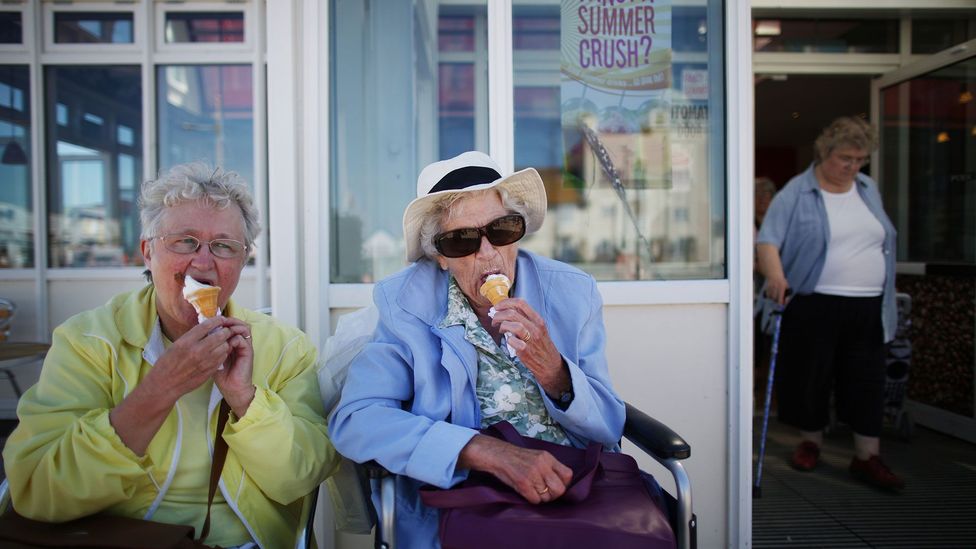How Long Should Baby Feed on Each Side
The undercover to a long and healthy life? Consume less
(Epitome credit:
Getty Images
)

Permanently cutting the daily calories you consume may turn out to have a profound effect on your future life, according to some tantalising scientific studies.

BBC Hereafter has brought you in-depth and rigorous stories to help you navigate the current pandemic, but nosotros know that'due south non all you want to read. So now nosotros're dedicating a series to aid you escape. Nosotros'll be revisiting our near popular features from the last three years in our Lockdown Longreads .
You lot'll detect everything from the story nigh the world's greatest space mission to the truth about whether our cats actually love u.s., the epic chase to bring illegal fishermen to justice and the small team which brings long-buried World War 2 tanks back to life. What you lot won't notice is any reference to, well, you-know-what. Enjoy.
In a eatery setting old in the not-too distant hereafter, a man and a woman are on their commencement appointment. Later on the initial nerves subside, all is going well.
The man is 33, he says, has been single for most of those years, and, although he doesn't mention it, knows he is looking to settle downwardly and have a family unit. The woman replies that she is 52, has been married, divorced, and has children in their early 20s. He had no idea – she looked his historic period, or younger.
This is a dream of Julie Mattison from the National Found on Ageing (NIA) in the Us. She envisions a time when chronological age ticks by with every year, simply biological age can exist set to a different timer, where elderly doesn't hateful what it does at present.
It sounds far-fetched, but our society has already made great strides towards that goal, thanks to advances in medicine and improvements in healthy living. In 2014, for instance, the United States Health Interview Survey reported that 16% of people aged between 50 and 64 were dumb every day with chronic illness. Iii decades earlier that number was 23%. In other words, besides as benefiting from longer lifespans, we are also experiencing longer "healthspans" – and the latter is proving to be even more malleable. To paraphrase and update a oral communication from John F Kennedy given at the first White Business firm Conference on Ageing in 1961, life can indeed be added to years, rather than simply years added to life.
So, what do we demand to do to heighten the length and quality of our lives even more? Researchers worldwide are pursuing various ideas, but for Mattison and colleagues, the answer is a simple change in diet. They believe that the fundamental to a improve old age may be to reduce the amount of nutrient on our plates, via an approach chosen "calorie restriction". This diet goes farther than cutting back on fatty foods from time-to-fourth dimension; it'south about making gradual and careful reductions in portion size permanently. Since the early on 1930s, a 30% reduction in the amount of food consumed per day has been linked to longer, more active lives in worms, flies, rats, mice, and monkeys. Across the fauna kingdom, in other words, calorie restriction has proven the best remedy for the ravages of life. And information technology's possible that humans accept but as much to proceeds.

High calorie foods can be hard to avoid today (Credit: Getty Images)
The idea that what a person eats influences their health no doubtfulness predates whatsoever historical accounts that remain today. But, equally is often the example for whatsoever scientific subject field, the beginning detailed accounts come from Aboriginal Hellenic republic. Hippocrates, one of the first physicians to claim diseases were natural and not supernatural, observed that many ailments were associated with gluttony; obese Greeks tended to die younger than slim Greeks, that was articulate and written downward on papyrus.
Spreading from this epicentre of scientific discipline, these ideas were adopted and adjusted over the centuries. And at the end of the 15th Century, Alvise Cornaro, an infirm blueblood from a small village near Venice in Italy, turned the prevailing wisdom on its head, and on himself.
If indulgence was harmful, would dietary divineness exist helpful? To find out, Cornaro, aged forty, ate only 350g (12oz) of food per day, roughly thousand calories according to contempo estimates. He ate bread, panatela or broth, and eggs. For meat he chose veal, goat, beefiness, partridge, thrush, and any poultry that was available. He bought fish caught from the local rivers.
Restricted in amount merely non variety, Cornaro claimed to take achieved "perfect health" up until his death more than twoscore years later. Although he inverse his birthdate as he anile, challenge that he had reached his 98th year, it is thought that he was around 84 when he died – still an impressive feat in the 16th Century, a fourth dimension when 50 or lx years old was considered elderly. In 1591, his grandson published his posthumous iii-volume tome entitled "Discourses on the Sober Life," pushing dietary restriction into the mainstream, and redefining ageing itself.
With an additional boost of health into the evening of life, the elderly, in full possession of their mental capacities, would be able to put decades of clustered knowledge to good use, Carnaro claimed. With his diet, beauty became the aged, non the youthful.
Longevity trials
Cornaro was an interesting man merely his findings are not to be taken as fact by any branch of science. Even if he was truthful to his word and did not suffer ill health for almost half a century, which seems unlikely, he was a example report of i – not representative of humans as a whole.
But since a foundational report in 1935 in white rats, a dietary restriction of between xxx-50% has been shown to extend lifespan, delaying death from age-related disorders and disease. Of class, what works for a rat or whatever other laboratory organism might not work for a man.

Information technology may audio obvious, simply what you choose to put in your trolley can have a profound effect on the length and quality of your life (Credit: Getty Images)
Long-term trials, post-obit humans from early adulthood to death, are a rarity. "I don't see a homo study of longevity equally something that would be a fundable research programme," says Mattison. "Even if you start humans at xl or 50 years sometime, you're even so looking at potentially forty or 50 more years [of study]." Plus, she adds, ensuring that inapplicable factors – do, smoking, medical treatments, mental wellbeing – don't influence the trial'due south terminate results is near impossible for our socially and culturally circuitous species.
That'due south why, in the late 1980s, ii independent long-term trials – 1 at NIA and the other at the University of Wisconsin – were gear up up to study calorie restriction and ageing in Rhesus monkeys. Not just do we share 93% of our Deoxyribonucleic acid with these primates, we historic period in the same fashion also.
Slowly, after eye age (effectually 15 years in Rhesus monkeys) the back starts to hunch, the pare and muscles kickoff to sag, and, where it yet grows, pilus goes from gingery brown to grey. The similarities go deeper. In these primates, the occurrence of cancer, diabetes, and heart illness increases in frequency and severity with historic period. "They're an excellent model to written report ageing," says Rozalyn Anderson, a gerontologist from the University of Wisconsin.
And they're easy to command. Fed with specially fabricated biscuits, the diets of the 76 monkeys at the University of Wisconsin and the 121 at NIA are tailored to their historic period, weight, and natural appetite. All monkeys receive the full complement of nutrients and minerals that their bodies crave. It'southward just that one-half of the monkeys, the calorie restricted (or CR) group, eat thirty% less.
They are far from malnourished or starving. Take Sherman, a 43-twelvemonth-quondam monkey from NIA. Mattison says that since being placed on the CR diet in 1987, anile 16, Sherman hasn't shown any overt signs of hunger that are well characterised in his species.

Rhesus monkeys given a stricter, depression calorie diet lived longer (Credit: Getty Images)
Sherman is the oldest Rhesus monkey ever recorded, nearly xx years older than the average lifespan for his species in captivity. Every bit younger monkeys were developing diseases and dying, he seemed to exist immune to ageing. Even into his 30s he would have been considered an old monkey, but he didn't expect or act like one.
The same is true, to varying extents, for the balance of his experimental troop at NIA. "Nosotros have a lower incidence of diabetes, and lower incidence of cancer in the CR groups," says Mattison. In 2009, the Academy of Wisconsin trial published similarly spectacular results.
Not only did their CR monkeys look remarkably younger – with more hair, less sag, and chocolate-brown instead of grayness – than monkeys that were fed a standard nutrition, they were healthier on the inside likewise, free from pathology. Cancers, such as the common abdominal adenocarcinoma, were reduced past over 50%. The risk of heart disease was similarly halved. And while 11 of the advertizement libitum ("at one's pleasance," in Latin) monkeys adult diabetes and five exhibited signs that they were pre-diabetic, the blood glucose regulation seemed healthy in all CR monkeys. For them, diabetes wasn't a affair.
Overall, only 13% of the monkeys in the CR grouping had died of age-related causes in xx years. In the advertizement libitum grouping, 37% had died, well-nigh three times as many. In an update study from the University of Wisconsin in 2014, this percentage remained stable.
"Nosotros have demonstrated that ageing tin can be manipulated in primates," says Anderson. "It kind of gets glossed over because it'southward obvious, but conceptually that's hugely of import; it means that ageing itself is a reasonable target for clinical intervention and medical treatment."
If ageing tin exist delayed, in other words, all of the diseases associated with it will follow arrange. "Going after each disease one at a time isn't going to significantly extend lifespan for people because they'll die of something else," says Anderson. "If you cured all cancers, you wouldn't start death due to cardiovascular disease, or dementia, or diabetes-associated disorders. Whereas if yous go after ageing y'all tin offset the lot in one become."

Calorie restriction involves a permanent reduction in a nutrition (Credit: Getty Images)
Eating less certainly seemed to help the monkeys, simply calorie restriction is much tougher for people out in the real globe. For one, our access to regular, high-calorie meals is now easier than ever; with companies like Deliveroo and UberEats, in that location is no longer a need to walk to the restaurant anymore. And two, gaining weight only comes more naturally to some people.
"At that place's a huge genetic component to all of this and its much harder work for some people than it is for others to stay trim," says Anderson. "Nosotros all know someone who tin swallow an entire cake and null happens, they look the verbal same. And then someone else walks by a table with a cake on it and they take to go up a pant size."
Ideally, the amount and types of food we eat should exist tailored to who nosotros are – our genetic predisposition to gaining weight, how we metabolise sugars, how we store fatty, and other physiological fluxes that are beyond the telescopic of scientific instruction at the moment, and maybe forever.
But a predisposition to obesity can be used as a guide to life choices rather than an inevitability. "I personally have a genetic history of obesity running through my family, and I practice a flexible form of caloric brake," says Susan Roberts a dietary scientist at Tufts University in Boston. "I keep my BMI at 22, and [accept calculated] that that requires eating eighty% of what I would eat if my BMI was at xxx similar every other member of my family." Roberts stresses that information technology isn't difficult – she follows her own weight management programme using a tool called iDiet to help her eat less but avert feeling hungry or deprived of enjoyment. If this wasn't possible, she adds, she wouldn't practise calorie brake.
Non only has Roberts seen the problems of obesity get-go-hand in her family, she knows the benefits of CR improve than about. For over 10 years she has been a leading scientist in the Comprehensive Cess of Long-Term Effects of Reducing Intake of Free energy trial, also known as Calerie. Over two years, 218 salubrious men and women aged between 21 and fifty years were dissever into 2 groups. In one, people were immune to eat every bit they normally would (advertising libitum), while the other ate 25% less (CR). Both had wellness checks every six months.
Unlike in the Rhesus monkey trials, tests over 2 years can't make up one's mind whether CR reduces or delays age-related diseases. At that place but isn't enough time for their development. But the Calerie trials tested for the next best thing: the early biological signs of heart disease, cancer, and diabetes.
Published in 2015, the results after two years were very positive. In the blood of calorie-restricted people, the ratio of "good" cholesterol to "bad" cholesterol had increased, molecules associated with neoplasm formation – chosen neoplasm necrosis factors (TNFs) – were reduced by effectually 25%, and levels of insulin resistance, a sure sign of diabetes, brutal by nigh 40% compared to people who ate their normal diets. Overall, the blood'south pressure level was lower.
Admittedly, some benefits may come from weight-loss. Earlier trials from Calerie had included people that were obese equally well every bit those with a healthy torso mass index (BMI) of 25 or below, and slimming downwardly would have certainly improved the welfare of the heavier participants. "I affair that's been very clear for a long time is that being overweight or obese is bad for you," says Roberts. Diseases and disorders previously thought to be age-associated diseases are now popping up in the obese population, she adds.
Simply the latest results suggested that significant health benefits can be garnered in an already healthy body – a person who isn't underweight or obese. That is, someone whose BMI lies between eighteen.v and 25.
Despite these results, evidence from further trials volition be needed before someone with an already healthy BMI should be advised to reduce their calorie intake. (And anyone wanting to modify their diet would be advised to consult a medical professional beforehand.)

Elderly life need not exist one of illness and illness (Credit: Getty Images)
In the meantime, the scientists will be hoping that their rhesus macaques may help united states of america to understand exactly why calories brake may have these effects. With most 30 years of data on lives and deaths, and blood and tissue samples, from virtually 200 monkeys, the piece of work at NIA and the University of Wisconsin aim to smoothen a light into the blackness box of calorie restriction, illuminating just how it delays ageing.
With less food, is the metabolism forced to be more than efficient with what it has? Is there a common molecular switch regulating ageing that is turned on (or off) with fewer calories? Or is there an as of yet unknown machinery underpinning our lives and deaths? The importance of monkeys similar Sherman far outspans their lives.
Answers to such questions might exist long in coming. "If I cloned 10 of myself and we all worked furiously, I don't think we'd have information technology solved," says Anderson. "The biology is inordinately complicated." It's a worthwhile undertaking – understand how CR works and other treatments could then be used to target that specific part of our biology. Ageing could be treated directly, that is, without the need of calorie restriction. "And I retrieve that's really the aureate ticket," says Anderson.
Although defective a dandy caption, calorie brake is one of the most promising avenues for improving wellness and how long information technology lasts in our lives. "There was nothing in what we saw that fabricated us think caloric restriction doesn't piece of work in people," says Roberts, from the Calerie trial. And, unlike drug-based treatments, information technology doesn't come with a long list of possible side effects. "Our people were not hungrier, their mood was fine, their sexual function was fine. We looked pretty hard for bad things and didn't detect them," says Roberts.
One expected issue was a slight decrease in bone density that is often tied to gradual weight loss, says Roberts. Simply every bit a precaution, volunteers were provided with small calcium supplements throughout the trial.
Even with such promising findings, "this [the Calerie trial] is the start study of its kind, and I don't remember that whatever of the states would feel confident in saying, 'okay, we're going to recommend this to everyone in the earth,'" says Roberts. "But it's a really heady prospect. I think that delaying the progression of chronic diseases is something that everyone tin can get backside and go excited nigh, because nobody wants to live life with i of those."
Alex Riley is a author based in Berlin, Germany. He tweets as @riley__alex .
Disclaimer
All content within this story is provided for full general information simply, and should not be treated as a substitute for the medical advice of your ain doctor or whatever other wellness care professional. The BBC is non responsible or liable for any diagnosis made past a user based on the content of this site. The BBC is not liable for the contents of any external internet sites listed, nor does it endorse any commercial product or service mentioned or brash on any of the sites. Always consult your own GP if you're in any way concerned about your health.
Join 800,000+ Future fans by liking us on Facebook , or follow u.s. on Twitter .
Source: https://www.bbc.com/future/article/20170601-the-secret-to-a-long-and-healthy-life-eat-less
0 Response to "How Long Should Baby Feed on Each Side"
Post a Comment